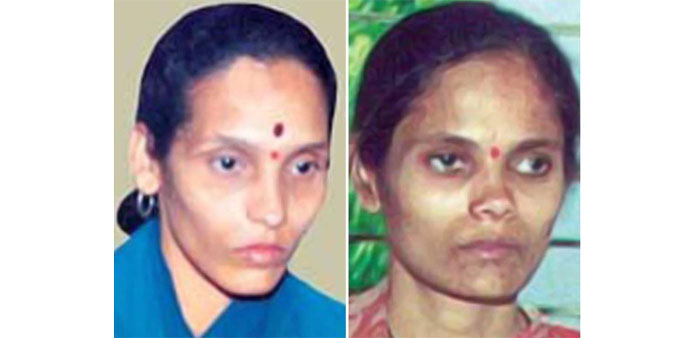AFP/New Delhi
An Indian court on Wednesday put on hold the execution of two sisters on death row for murdering five children, a lawyer for the women said.
Renuka Shinde and her step-sister Seema Gavit will be the first women executed in post-independence India if the punishment goes ahead.
The pair were convicted in 2001 of kidnapping 13 children, forcing them to join a gang of thieves, and killing at least five of them.
The sisters used the children to distract victims while the women robbed them, according to media reports of the trial.
The children were also forced to beg and work as pick-pockets. Shinde and Gavit reportedly banged their victims' heads against the wall to kill them.
The sisters had lodged a last-ditch appeal in the Mumbai High Court on Tuesday on the grounds that the 13-year delay in carrying out the death sentence was excessive.
"The High Court has admitted their petition questioning the inordinate delay in carrying out the sentence," Sudeep Jaiswal, the women's lawyer, told AFP.
The High Court has now asked the Maharashtra state government to file its reply by September 9, the next date for the hearing.
In a landmark ruling this year, India's Supreme Court said "inordinate and inexplicable" delays in carrying out executions were grounds for commuting death sentences.
Shinde, 45, and Gavit, 39, were initially accused of murdering nine children, but prosecutors were only able to prove that they killed five.
The Supreme Court upheld their sentence in 2006 and last month President Pranab Mukherjee, who has the power to commute a death sentence, rejected their appeal.
Indian courts can only sentence convicts to death if the crime qualifies as a "rarest of rare case".
Earlier this year a Mumbai court ordered three men to hang for their involvement in two gang-rape cases, the first death sentences to be handed down for multiple sex attacks since the law was toughened last year.
Their sentences must be confirmed by the Supreme Court.
The last person to be executed in India was a local Kashmiri man last year over a deadly 2001 attack on the national parliament in New Delhi.

